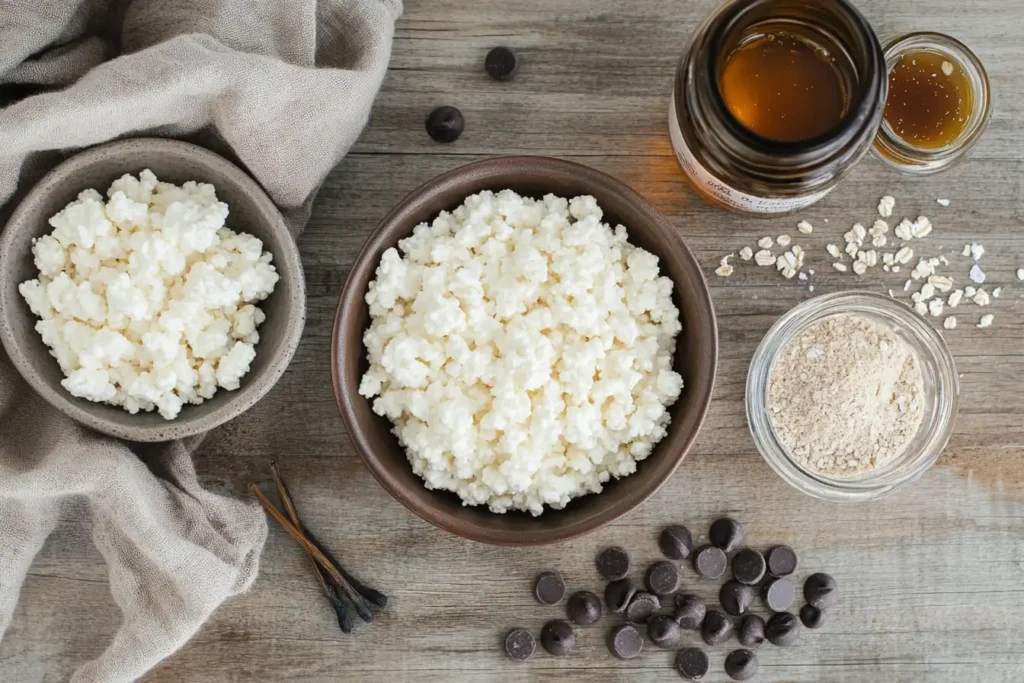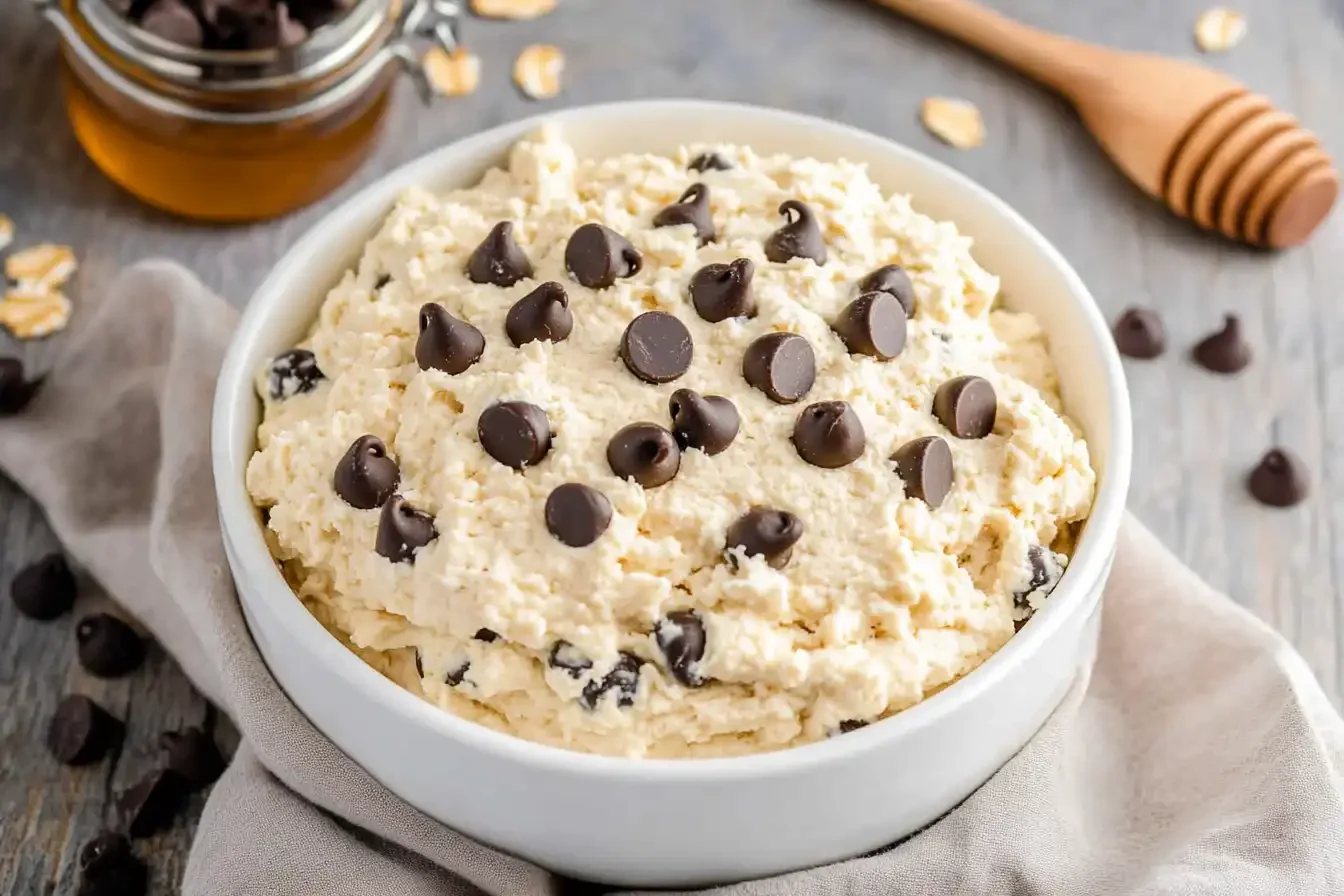Imagine indulging in the creamy decadence of cookie dough without a trace of guilt—sounds too good to be true, right? Cottage cheese cookie dough is here to revolutionize the way you think about desserts. This recipe isn’t just a twist on a classic treat; it’s a health-conscious choice packed with protein, nutrients, and flavor. Whether you’re a fitness enthusiast or a dessert lover seeking a nutritious alternative, this dough offers the best of both worlds. Let’s dive in and explore everything you need to know about this versatile delight.
What Is Cottage Cheese Cookie Dough?
Cottage cheese cookie dough is a high-protein, low-fat alternative to traditional cookie dough, designed to satisfy your cravings while aligning with your health goals. Unlike regular dough, it swaps butter and refined sugar for nutrient-dense ingredients, with cottage cheese taking center stage. This no-bake treat can be enjoyed raw, thanks to its safe, egg-free composition. Whether you’re looking for a snack or a dessert option, cottage cheese cookie dough ticks all the boxes.
A Unique Spin on Traditional Cookie Dough
What sets cottage cheese cookie dough apart? First, it brings a creamy texture and tangy flavor to the mix, which blends harmoniously with classic cookie dough ingredients like oats, chocolate chips, and vanilla. While traditional dough leans heavily on butter and sugar, this version leverages the natural creaminess of cottage cheese to create a lighter yet equally indulgent experience. It’s not just different—it’s better for you.
Why Cottage Cheese? The Secret Ingredient
Cottage cheese might not be the first thing that comes to mind when you think of desserts, but its creamy consistency and nutritional profile make it the perfect base. Packed with protein, calcium, and essential amino acids, it transforms cookie dough into a guilt-free treat. Its versatility allows it to blend seamlessly with sweeteners, flavors, and mix-ins, making it a go-to choice for health-conscious bakers. Plus, its low-fat content makes it ideal for those keeping an eye on their calorie intake.
Overview of Nutritional Benefits
When it comes to nutrition, cottage cheese cookie dough is a game-changer. Unlike traditional cookie dough, it’s lower in sugar and fat but higher in protein—offering a more balanced option for snack time. Cottage cheese provides essential vitamins like B12 and calcium, supporting bone health and energy production. Combined with high-fiber add-ins like oats or nuts, this dough delivers sustained energy without the sugar crash. It’s indulgence with a purpose.
Why Cottage Cheese Cookie Dough Is a Healthier Option
In a world where snacks often come loaded with hidden sugars and unhealthy fats, cottage cheese cookie dough emerges as a refreshing alternative. With its balanced nutritional profile and versatility, this innovative treat supports your health goals without compromising on flavor. Let’s explore why this dough is a better choice for your indulgence.
High Protein Content for Sustained Energy
Protein is the cornerstone of a balanced diet, offering benefits that go beyond muscle building. Cottage cheese cookie dough stands out as a protein-packed snack that helps sustain energy levels throughout the day. With each bite, you’re consuming a source of slow-digesting protein, which stabilizes blood sugar levels and keeps hunger at bay. Compared to traditional cookie dough, which relies heavily on refined carbohydrates, this version provides a more enduring sense of fullness.
The combination of cottage cheese and high-fiber add-ins like oats or chia seeds creates a powerhouse snack that supports post-workout recovery, muscle repair, and even weight management. Whether you’re tackling a busy workday or heading to the gym, this dough has your back.
Lower in Sugar and Fats Compared to Traditional Doughs
One of the biggest pitfalls of traditional cookie dough is its high content of refined sugar and saturated fats. These ingredients, while delicious, can contribute to energy crashes and long-term health issues. Thankfully, cottage cheese cookie dough flips the script. It’s naturally lower in sugar, especially when sweetened with alternatives like honey, maple syrup, or stevia. This allows you to enjoy a sweet treat without the guilt.
Moreover, cottage cheese’s low-fat profile makes this dough an excellent choice for anyone looking to cut back on unhealthy fats. Replacing butter with this nutrient-rich dairy product slashes the calorie count while maintaining the creamy texture we all love in cookie dough.
For a deeper dive into the health benefits of cottage cheese, check out this resource on Cottage Cheese Benefits.
Packed with Calcium and Essential Nutrients
Cottage cheese is renowned for being a rich source of calcium, a vital mineral that promotes strong bones and teeth. But its benefits don’t stop there! This dairy product is also loaded with B vitamins, zinc, and magnesium, all of which contribute to overall well-being.
When incorporated into cookie dough, it transforms a once indulgent dessert into a nutrient-packed snack. It’s not just about satisfying your sweet tooth; it’s about nourishing your body in the process. With every bite, you’re getting a dose of vitamins and minerals that support everything from energy production to immune health.
Ideal for Fitness Enthusiasts and Weight Watchers
Fitness buffs and calorie-conscious individuals, rejoice! Cottage cheese cookie dough aligns perfectly with your lifestyle. Its high protein content aids muscle recovery after workouts, while its low calorie and fat profile help maintain a calorie deficit without sacrificing flavor.
Unlike traditional snacks, which often derail weight loss goals, this dough is designed to support them. It’s customizable, too—add chia seeds for extra fiber, or toss in dark chocolate chips for a guilt-free touch of sweetness. With such versatility, it’s no wonder this dough has become a staple for those seeking healthier dessert options.
Step-by-Step Recipe for Cottage Cheese Cookie Dough
Making cottage cheese cookie dough at home is surprisingly easy. With a handful of ingredients and minimal equipment, you can whip up this high-protein treat in no time. Whether you’re a seasoned cook or a kitchen novice, this step-by-step guide will ensure success.
Ingredients You Will Need

To create this deliciously nutrient-rich cookie dough, gather the following simple ingredients:
- 1 cup of low-fat cottage cheese (blended for a smooth texture)
- 1 cup of oat flour (or blended oats)
- 2–3 tablespoons of honey, maple syrup, or your preferred sweetener
- 1 teaspoon vanilla extract
- A pinch of salt
- ½ cup of dark chocolate chips or your favorite mix-ins
These ingredients provide a perfect balance of flavor and nutrition, making your dough not just tasty but also a health-conscious choice.
Equipment Checklist
Having the right tools on hand can make the process seamless. Here’s what you’ll need:
- A food processor or blender (for a creamy cottage cheese base)
- A mixing bowl
- A silicone spatula
- Measuring cups and spoons
If you don’t have a food processor, don’t worry—just use a handheld blender or mash the cottage cheese manually for a chunkier texture.
Instructions for Preparing the Dough
Follow these simple steps to create cottage cheese cookie dough:
- Blend the Cottage Cheese
Place the cottage cheese in a food processor or blender. Blend until smooth and creamy, ensuring no lumps remain. This step is crucial for achieving that silky texture. - Combine the Dry Ingredients
In a mixing bowl, combine oat flour and a pinch of salt. Stir well to distribute the salt evenly. - Mix Wet Ingredients
In another bowl, mix the blended cottage cheese, sweetener, and vanilla extract. Gradually combine the wet mixture with the dry ingredients, stirring gently until fully incorporated. - Add Your Mix-ins
Fold in dark chocolate chips or any preferred add-ins using a silicone spatula. This step is where you can get creative with flavors. - Chill and Serve
Transfer the dough to an airtight container and refrigerate for 30 minutes to let the flavors meld and the dough firm up. Serve it straight from the fridge for the best texture!
Tips for Perfect Consistency
- Ensure the cottage cheese is blended thoroughly to avoid lumps.
- Add oat flour gradually to control the thickness of the dough.
- If the mixture feels too thick, incorporate a tablespoon of milk or yogurt to loosen it up.
Variations and Flavor Add-Ins
Customizing your cottage cheese cookie dough can be as fun as making it. Here are some exciting variations:
Chocolate Chip Cottage Cheese Cookie Dough
For a classic touch, mix in dark chocolate chips. The contrast of creamy dough and melty chocolate is irresistible. You can also add a sprinkle of sea salt on top for a gourmet twist.
Peanut Butter and Oats Variation
Add 2 tablespoons of peanut butter to the base recipe for a nutty flavor. Enhance it with a handful of rolled oats for added texture. This variation is perfect for an energy-packed snack.
Vegan Cottage Cheese Alternatives
Want to keep it plant-based? Replace cottage cheese with blended tofu or a vegan cream cheese substitute. Use agave syrup instead of honey and opt for vegan chocolate chips for a fully vegan treat.
With these simple steps and creative add-ins, you’ll have a batch of healthy, indulgent cookie dough ready to enjoy in no time.
Creative Ideas for Cottage Cheese Cookie Dough
Cottage cheese cookie dough isn’t just a snack—it’s a versatile addition to your culinary repertoire. Whether you enjoy it straight from the fridge or incorporate it into other dishes, this protein-packed dough opens the door to countless possibilities. Let’s explore some creative ways to enjoy this tasty treat.

As a Guilt-Free Snack
For those moments when cravings strike, cottage cheese cookie dough is the ultimate guilt-free indulgence. Scoop it into small bowls, add a sprinkle of dark chocolate chips, and enjoy it as a satisfying snack. Its high protein content and balanced sweetness make it perfect for curbing hunger between meals or after workouts. Best of all, it feels indulgent without sabotaging your healthy eating goals.
Toppings for Yogurt or Ice Cream
Elevate your desserts with a dollop of cottage cheese cookie dough. Add it as a topping for Greek yogurt or vanilla ice cream for a unique twist. The creamy, slightly tangy dough complements the richness of ice cream or the tartness of yogurt, creating a dessert that’s both nutritious and delicious. You can even sprinkle some granola or crushed nuts on top for added crunch.
Filling for Pastries or Cakes
Transform your baked goods with a nutrient-packed filling. Use cottage cheese cookie dough as a stuffing for pastries, such as crescent rolls or turnovers. It can also be spread between cake layers for a rich, creamy surprise. The dough’s natural sweetness and velvety texture make it an ideal complement to baked treats, adding a boost of protein and flavor.
Spread for Toast or Bagels
Who says spreads need to be savory? Cottage cheese cookie dough makes a delightful topping for toast or bagels. Simply spread a generous layer on whole-grain bread or your favorite bagel for a quick breakfast or snack. Enhance it with banana slices, berries, or a drizzle of honey for an extra touch of sweetness. This combination is not only delicious but also energizing, making it a great way to start your day.
If you’re looking for more creative ways to use cottage cheese, check out this Cottage Cheese Flatbread Recipe for another versatile and healthy option.
Avoid These Pitfalls When Making Cottage Cheese Cookie Dough
While cottage cheese cookie dough is relatively simple to prepare, a few common mistakes can affect the final result. Let’s identify these pitfalls and explore tips to ensure your dough turns out perfect every time.
Overmixing the Ingredients
One of the most frequent mistakes is overmixing the dough. While it might seem like more mixing would lead to a smoother consistency, it can actually result in a dense and overly sticky texture. To avoid this, combine your ingredients just until everything is well incorporated. Overworking the mixture can also impact the texture of your add-ins, like chocolate chips or oats, diminishing their appeal.
Using the Wrong Type of Cottage Cheese
Not all cottage cheese is created equal. Using a variety that’s too watery can lead to a runny dough, while overly dense cottage cheese might make the mixture too thick. For the best results, opt for low-fat or regular cottage cheese with a creamy consistency. If the texture is too chunky, blend it beforehand to achieve a smooth base for your dough.
Storing the Dough Improperly
Improper storage can cause your cottage cheese cookie dough to dry out or lose its flavor. Always store it in an airtight container in the refrigerator to maintain freshness and consistency. If you’re planning to keep it for more than a few days, freezing is an excellent option. Just portion the dough into smaller containers or bags before freezing to make defrosting easier.
How Cottage Cheese Cookie Dough Stacks Up Against Traditional Dough
Curious how cottage cheese cookie dough fares nutritionally compared to its traditional counterpart? This section breaks down the numbers and showcases why this alternative is a healthier choice.
Calorie Breakdown
Traditional cookie dough is calorie-dense, thanks to ingredients like butter, sugar, and flour. In contrast, cottage cheese cookie dough replaces high-calorie components with nutrient-dense options like oat flour and cottage cheese. On average, a serving of this alternative contains 30–40% fewer calories, making it an excellent option for those watching their intake.
Protein and Fiber Content
Unlike traditional dough, which is low in protein, cottage cheese cookie dough is a powerhouse of muscle-building nutrients. Cottage cheese contributes a significant protein boost, while fiber-rich ingredients like oats enhance digestion and prolong satiety. This combination helps maintain energy levels throughout the day, making it a functional snack option.
Sugar and Fat Levels
The sugar content in regular cookie dough is typically sky-high, leading to energy crashes and unnecessary calories. With cottage cheese cookie dough, natural sweeteners like honey or stevia reduce sugar levels while preserving sweetness. Similarly, swapping butter for cottage cheese significantly cuts unhealthy fats, replacing them with nutrient-packed dairy goodness.
Vegan and Gluten-Free Adaptations
For those with dietary restrictions, cottage cheese cookie dough can be easily adapted. Use vegan substitutes like tofu-based cream cheese or dairy-free yogurts, and replace oat flour with almond flour or gluten-free blends. These changes retain the dough’s creamy texture and nutritional benefits while accommodating dietary needs.
FAQs About Cottage Cheese Cookie Dough
Curiosity often accompanies creativity in the kitchen. Here are some answers to common questions about cottage cheese cookie dough, its uses, and its unique characteristics.
Is cottage cheese good for baking?
Absolutely! Cottage cheese is versatile and can be used in both savory and sweet recipes. Its creamy texture and mild flavor blend well into baked goods, adding moisture and a boost of protein. From cookies to casseroles, it’s a fantastic ingredient that enhances the nutritional value of your dishes.
Why is my cottage cheese cookie dough runny?
Runny dough is often the result of using watery cottage cheese or failing to measure dry ingredients accurately. To fix this, drain excess liquid from the cottage cheese before blending or add extra oat flour to thicken the mixture. Ensuring your ingredients are well-balanced will yield a perfectly creamy consistency.
Should cookie dough rest before baking?
Yes, resting cookie dough—even no-bake varieties like cottage cheese cookie dough—not only enhances its texture and flavor but also improves its overall consistency. By letting the dough chill for at least 30 minutes, the ingredients have time to meld together, which allows the flavors to intensify and the dough to firm up. As a result, it becomes significantly easier to work with and far more enjoyable to eat.
Does cottage cheese melt when you bake it?
Cottage cheese doesn’t melt like other cheeses; instead, it softens and incorporates into recipes. When used in cookie dough, it adds moisture without creating a liquidy mess, resulting in a chewy, tender texture when baked.
Is cottage cheese cookie dough safe to eat raw?
Yes, cottage cheese cookie dough is safe to eat raw! Unlike traditional cookie dough, it doesn’t contain raw eggs or raw flour, which are common sources of foodborne illness. By using oat flour and ensuring high-quality ingredients, this dough is completely edible without baking.
What makes cookie dough fluffy?
Fluffiness in cookie dough often comes from the incorporation of air during mixing and the balance of wet and dry ingredients. In cottage cheese cookie dough, the creamy consistency of the cottage cheese contributes to a lighter, fluffier texture while maintaining its high nutritional value.

